Module 6 Around town知识点讲解课件2021-2022学年外研版英语七年级下册(共39张PPT)
文档属性
| 名称 | Module 6 Around town知识点讲解课件2021-2022学年外研版英语七年级下册(共39张PPT) |
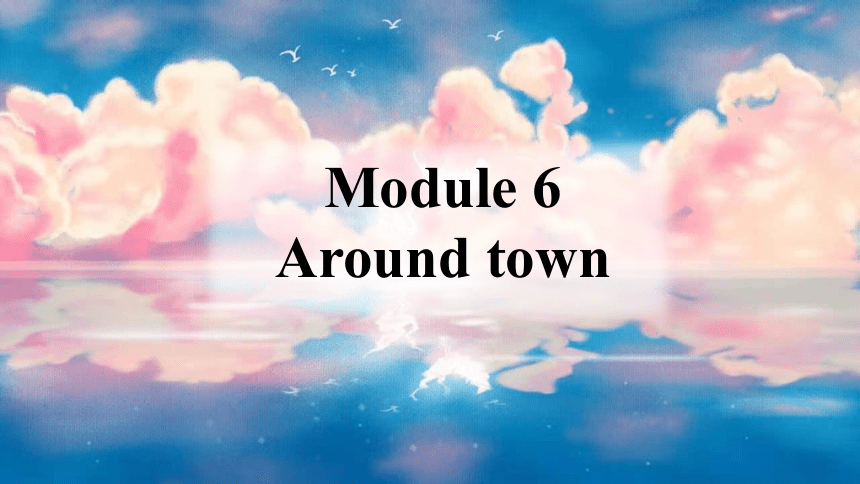
|
|
| 格式 | zip | ||
| 文件大小 | 449.6KB | ||
| 资源类型 | 教案 | ||
| 版本资源 | 外研版 | ||
| 科目 | 英语 | ||
| 更新时间 | 2022-01-11 00:00:00 | ||
图片预览

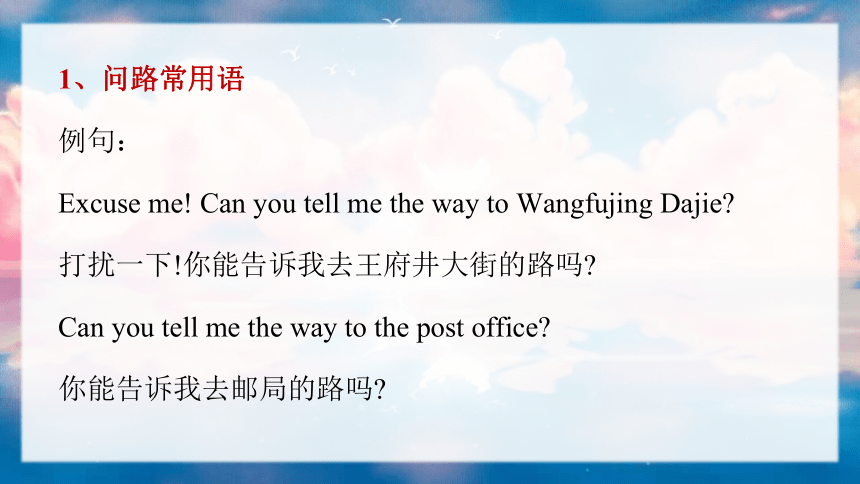
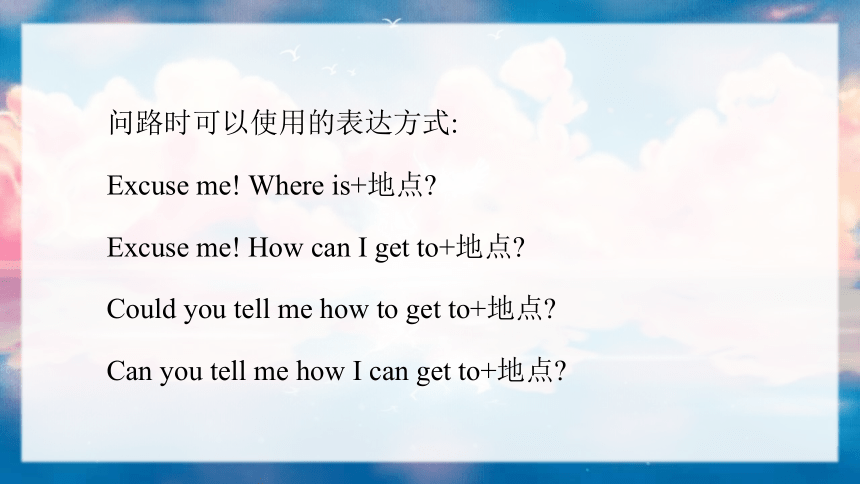

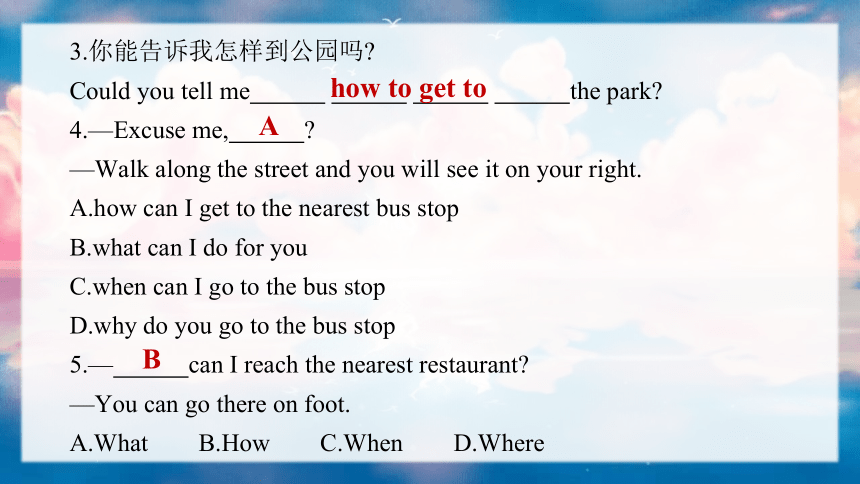
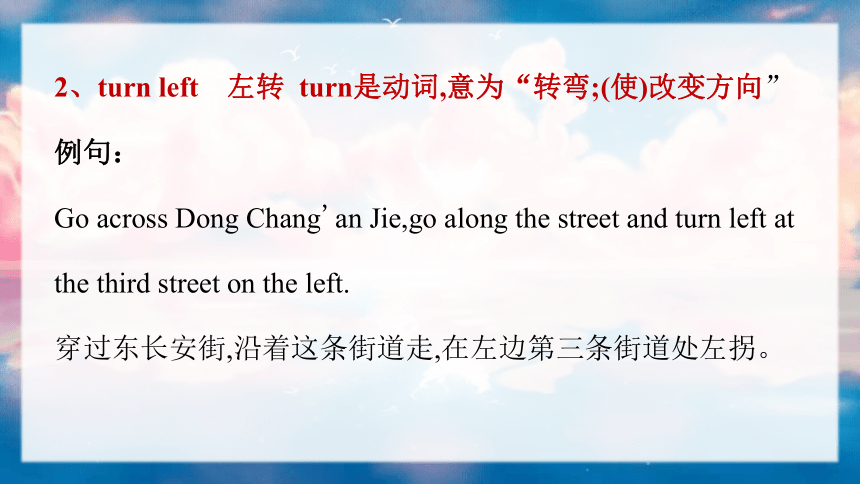
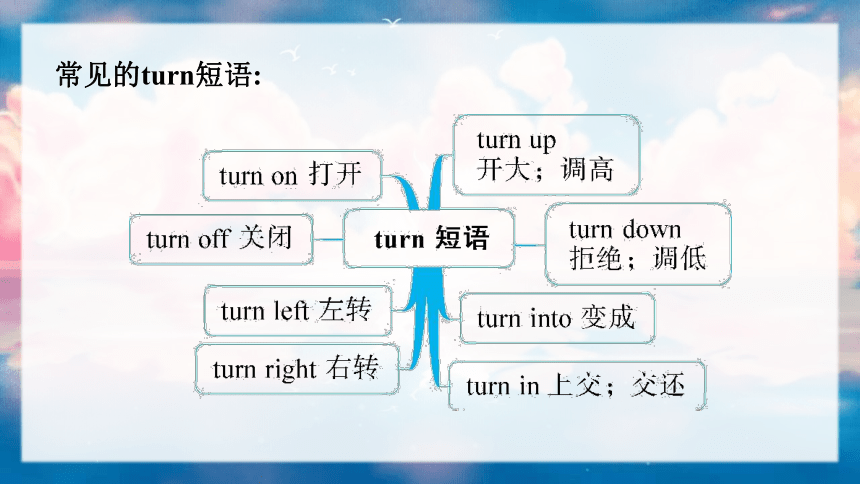
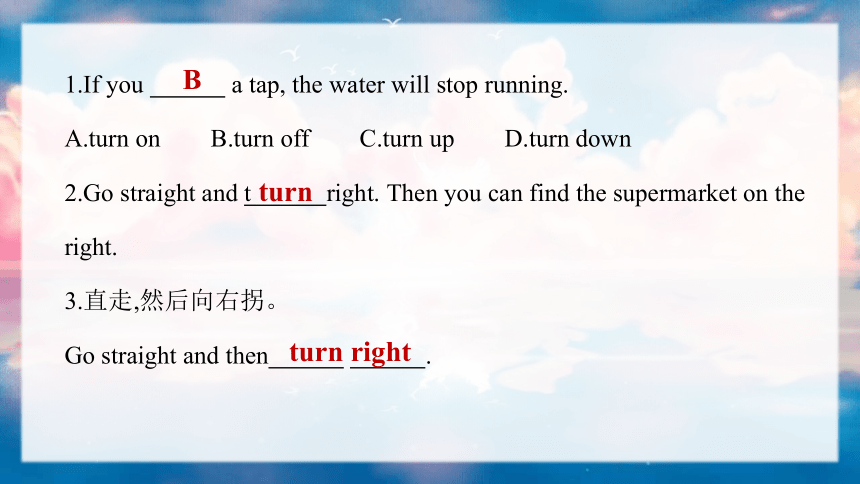
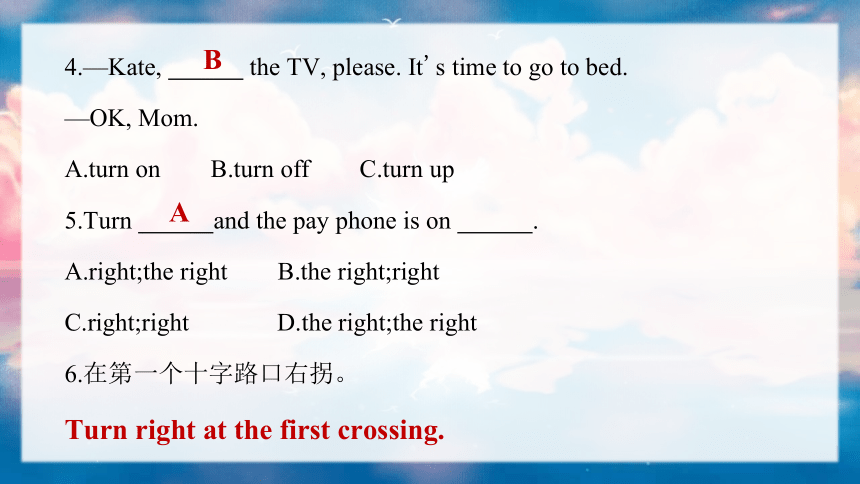

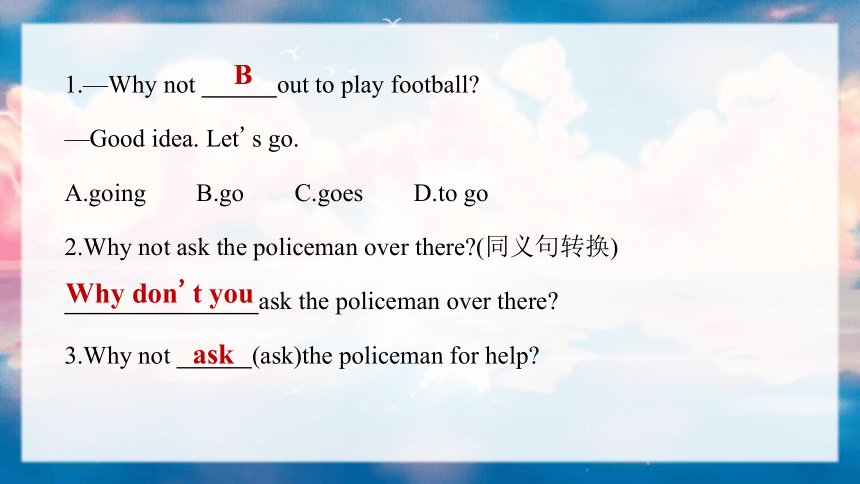
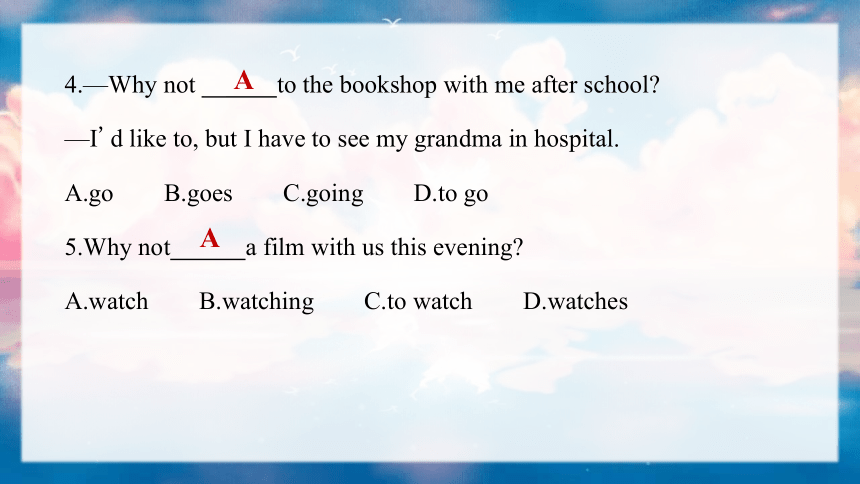
文档简介
(共39张PPT)
Module 6
Around town
1、问路常用语
例句:
Excuse me! Can you tell me the way to Wangfujing Dajie
打扰一下!你能告诉我去王府井大街的路吗
Can you tell me the way to the post office
你能告诉我去邮局的路吗
问路时可以使用的表达方式:
Excuse me! Where is+地点
Excuse me! How can I get to+地点
Could you tell me how to get to+地点
Can you tell me how I can get to+地点
1.—Excuse me,
—It's next to Wanda Cinema.
A.when is the movie on
B.what is your mother
C.who is the girl under the tree
D.where is the nearest bookshop
2.—Excuse me,
—Go along this road and turn left at the second crossing.
A.where is the bank, please
B.is there a bank near here
C.how can I get to the bank
D
C
3.你能告诉我怎样到公园吗
Could you tell me the park
4.—Excuse me,
—Walk along the street and you will see it on your right.
A.how can I get to the nearest bus stop
B.what can I do for you
C.when can I go to the bus stop
D.why do you go to the bus stop
5.— can I reach the nearest restaurant
—You can go there on foot.
A.What B.How C.When D.Where
A
B
how to get to
2、turn left 左转 turn是动词,意为“转弯;(使)改变方向”例句:
Go across Dong Chang'an Jie,go along the street and turn left at
the third street on the left.
穿过东长安街,沿着这条街道走,在左边第三条街道处左拐。
常见的turn短语:
1.If you a tap, the water will stop running.
A.turn on B.turn off C.turn up D.turn down
2.Go straight and t right. Then you can find the supermarket on the right.
3.直走,然后向右拐。
Go straight and then .
B
turn
turn right
4.—Kate, the TV, please. It's time to go to bed.
—OK, Mom.
A.turn on B.turn off C.turn up
5.Turn and the pay phone is on .
A.right;the right B.the right;right
C.right;right D.the right;the right
6.在第一个十字路口右拐。
Turn right at the first crossing.
B
A
3、Why not do sth. 为什么不做某事
=Why don't you do sth. ”,用于提出建议。
例句:Why not ask the policeman over there
为什么不问那边的那个警察呢
Why not join the Swimming Club
=Why don't you join the Swimming Club
为什么不加入游泳俱乐部呢
1.—Why not out to play football
—Good idea. Let's go.
A.going B.go C.goes D.to go
2.Why not ask the policeman over there (同义句转换)
ask the policeman over there
3.Why not (ask)the policeman for help
B
Why don't you
ask
4.—Why not to the bookshop with me after school
—I'd like to, but I have to see my grandma in hospital.
A.go B.goes C.going D.to go
5.Why not a film with us this evening
A.watch B.watching C.to watch D.watches
A
A
4、“特殊疑问词+动词不定式”的结构通常在句中作宾语。
例句:
Could you tell me how to get to the National Stadium
你能告诉我怎样到国家体育场吗
I haven't decided where to go.我还没决定去哪里。
I don't know what to do.我不知道要做什么。
1.My brother taught me how a model plane yesterday.
A.make B.makes C.made D.to make
2.Could you tell me the way to the railway station
Could you tell me get to the railway station
3.Let's discuss when we shall go to the Sea World. (改为同义句)
Let's discuss go to the Sea World.
D
how to
when to
4.Could you please tell me how (choose)your monitor
in your class
5.我们还没有决定什么时候探望爷爷奶奶。
We haven't decided our grandparents.
6.你能告诉我怎么使用这个手机吗
Could you tell me how to use the mobile phone
to choose
when to visit
5、famous 形容词,意为“著名的”=well-known
例句:
We're standing opposite the National Gallery, a famous museum with lots of famous paintings.
我们现在站在国家美术馆——一个有许多名画的著名博物馆——的对面。
She dreams of being a famous actress.
她梦想成为一名著名演员。
be famous for 因……而出名, for后接出名的原因。
如:Egypt is famous for its grand pyramids. 埃及以其巨大的金字塔而闻名。
be famous as 作为……而著名,as 后接职业、身份或地位。
如:She is famous as a writer.
她作为作家而出名。
1.潍坊是山东的一个城市。它因风筝而闻名。
Weifang is a city in Shandong. It kites.
2.Sanya is famous its good weather and beautiful beaches.
A.as B.for C.to D.with
3.库尔勒,新疆的一座美丽城市, 以美味的香梨而著称。
Korla, a beautiful city in Xinjiang, is its delicious pears.
is famous for
famous for
B
4.—Hainan its blue sky and fresh air.
—So it is. That's why more and more visitors spend their holidays here.
A.is weak in B.is famous for C.is used to
5.The Great Wall is very famous its history.
A.in B.as C.for D.to答
6.Stephen William Hawking is (著名的) as a physicist.
B
C
famous
6、with介词短语作后置定语,with表示“带有;具有”。
例句:
We're standing opposite the National Gallery, a famous museum
with lots of famous paintings.
我们现在站在国家美术馆——一个有许多名画的著名博物馆——的对面。
It is a large house with a garden.这是一个带有花园的大房子。
She is a girl with long hair. 她是一个留长发的女孩。
1.My grandma likes the big house a beautiful garden.
A.with B.have C.has D.for
2.这是一个具有悠久历史的博物馆。
This is a museum .
3.Next to the hotel a small house an interesting garden.
A.is;has B.are;with C.is;with D.are;has
4.I hope I have a nice house a big garden.
A.of B.with C.from D.about
A
with a long history
C
B
7、get off 下车
例句:
Get off the boat at Tower Bridge.
在塔桥下船。
We will get off at the next bus stop.
我们将在下一个公共汽车站下车。
常见的get短语:
1.—Excuse me, how can I get to the museum
—Take the No.3 bus and at the fourth stop.
A.get on B.get off C.get up D.get to
2.Hey, Mike. You can't the bus before it stops. It's dangerous.
A.look for B.put away
C.get up D.get off
3.下一站我得下车了。
I have to the bus at the next stop.
B
D
get off
4.Don't forget to take your bag when you the bus.
A.get off B.get up C.turn off D.turn on
5.You can take the No.1 bus and at the second stop.
A.look for B.try on
C.go over D.get off
6.You can't the bus until it stops.
A.get up B.get away C.get off
A
D
C
8、finish 动词,意为“完成;结束”。
注意 finish后若跟动词,只能跟动词-ing形式。
finish doing sth.做完某事
例句:
And this is where we'll finish our tour.
在这里我们将结束我们的伦敦游。
Every day I start work at 9:00 a.m. and finish at 5:00 p.m.
我每天上午九点开始工作,下午五点结束。
1.—Can you finish these books before 10 o'clock
—Yes, I can.
A.to read B.read C.reads D.reading
2.My little brother didn't go to bed until he
finished his homework last night.
A.do B.doing C.to do
3.Dave is a good boy and he always finishes his homework on time.
A.do B.did C.does D.doing
D
B
D
4.David finished (make)the model plane just now.
5.—Can you come to my birthday party tonight
—I'd love to, but I have to finish my English homework first.
A.doing B.to do C.does
6.We have no much time. You have to finish (eat) your breakfast in five minutes.
A
making
eating
9、辨析:across, through, over
across 在物体的表面穿过
表示从某个平面的一边移到另一边
through 从物体的内部穿过
表示“穿过”树林、洞、门、窗、房间等
over 在物体正上方跨过,并且不与物体接触
例句:
Let's go there and help the old man go across the street.
让我们去那里帮助那位老人穿过那条街道吧。
They are walking through the forest.
他们正在穿越那片森林。
The cat jumps over the wall and runs away.
那只猫越墙逃跑了。
注意 cross也表示“穿过;越过;横穿”,但它是动词,而across是介词。
cross相当于go/walk across。
The old man is crossing the street slowly.
=The old man is going/walking across the street slowly.
那个老人正在慢慢过马路。
1.The bright sunlight comes into the room the window.
A.through B.across C.past
2.He is crossing the street. (改为同义句)
He is the street.
3.You mustn't go a the road when the red light is on.
A
going across
across
4.Light comes in the window.
A.across B.cross C.through
5.I helped the old lady to walk (cross)the street slowly.
6.You must be careful when you go (越过)the street.
C
across
across
10、方位的表达方式
在问路和指路时,通常会用到方位介词或方位介词短语。常见的方位介词:
例句:His house is on the left of the street.
他的房子在街道的左边。
It's next to the supermarket.
它紧挨着超市。
The bank is opposite the cinema.
那家银行在电影院对面。
The museum is in front of the hotel.
博物馆在宾馆的前面。
The restaurant is between the bank and the school.
那家饭店在银行和学校之间。
The store is on the corner.
那家商店在拐角处。
1.你能看到那栋高楼吗 它就在电影院的右边。
Can you see the tall building It is the cinema.
2.The bank is next to the cinema. (对画线部分提问)
the bank
3.他正站在电影院的前面。
He is standing the cinema.
4.那家电影院就在银行的对面。
The cinema is .
on the right of
Where is
in front of
opposite the bank
5.Go across the street and turn left. Then you can find the bank the left.
A.at B.in C.on D.to答案
6.Go along the road, and the market is your right.
A.in B.on C.of
7.My home is (在……的对面)our school.
C
B
opposite
Thank you
Module 6
Around town
1、问路常用语
例句:
Excuse me! Can you tell me the way to Wangfujing Dajie
打扰一下!你能告诉我去王府井大街的路吗
Can you tell me the way to the post office
你能告诉我去邮局的路吗
问路时可以使用的表达方式:
Excuse me! Where is+地点
Excuse me! How can I get to+地点
Could you tell me how to get to+地点
Can you tell me how I can get to+地点
1.—Excuse me,
—It's next to Wanda Cinema.
A.when is the movie on
B.what is your mother
C.who is the girl under the tree
D.where is the nearest bookshop
2.—Excuse me,
—Go along this road and turn left at the second crossing.
A.where is the bank, please
B.is there a bank near here
C.how can I get to the bank
D
C
3.你能告诉我怎样到公园吗
Could you tell me the park
4.—Excuse me,
—Walk along the street and you will see it on your right.
A.how can I get to the nearest bus stop
B.what can I do for you
C.when can I go to the bus stop
D.why do you go to the bus stop
5.— can I reach the nearest restaurant
—You can go there on foot.
A.What B.How C.When D.Where
A
B
how to get to
2、turn left 左转 turn是动词,意为“转弯;(使)改变方向”例句:
Go across Dong Chang'an Jie,go along the street and turn left at
the third street on the left.
穿过东长安街,沿着这条街道走,在左边第三条街道处左拐。
常见的turn短语:
1.If you a tap, the water will stop running.
A.turn on B.turn off C.turn up D.turn down
2.Go straight and t right. Then you can find the supermarket on the right.
3.直走,然后向右拐。
Go straight and then .
B
turn
turn right
4.—Kate, the TV, please. It's time to go to bed.
—OK, Mom.
A.turn on B.turn off C.turn up
5.Turn and the pay phone is on .
A.right;the right B.the right;right
C.right;right D.the right;the right
6.在第一个十字路口右拐。
Turn right at the first crossing.
B
A
3、Why not do sth. 为什么不做某事
=Why don't you do sth. ”,用于提出建议。
例句:Why not ask the policeman over there
为什么不问那边的那个警察呢
Why not join the Swimming Club
=Why don't you join the Swimming Club
为什么不加入游泳俱乐部呢
1.—Why not out to play football
—Good idea. Let's go.
A.going B.go C.goes D.to go
2.Why not ask the policeman over there (同义句转换)
ask the policeman over there
3.Why not (ask)the policeman for help
B
Why don't you
ask
4.—Why not to the bookshop with me after school
—I'd like to, but I have to see my grandma in hospital.
A.go B.goes C.going D.to go
5.Why not a film with us this evening
A.watch B.watching C.to watch D.watches
A
A
4、“特殊疑问词+动词不定式”的结构通常在句中作宾语。
例句:
Could you tell me how to get to the National Stadium
你能告诉我怎样到国家体育场吗
I haven't decided where to go.我还没决定去哪里。
I don't know what to do.我不知道要做什么。
1.My brother taught me how a model plane yesterday.
A.make B.makes C.made D.to make
2.Could you tell me the way to the railway station
Could you tell me get to the railway station
3.Let's discuss when we shall go to the Sea World. (改为同义句)
Let's discuss go to the Sea World.
D
how to
when to
4.Could you please tell me how (choose)your monitor
in your class
5.我们还没有决定什么时候探望爷爷奶奶。
We haven't decided our grandparents.
6.你能告诉我怎么使用这个手机吗
Could you tell me how to use the mobile phone
to choose
when to visit
5、famous 形容词,意为“著名的”=well-known
例句:
We're standing opposite the National Gallery, a famous museum with lots of famous paintings.
我们现在站在国家美术馆——一个有许多名画的著名博物馆——的对面。
She dreams of being a famous actress.
她梦想成为一名著名演员。
be famous for 因……而出名, for后接出名的原因。
如:Egypt is famous for its grand pyramids. 埃及以其巨大的金字塔而闻名。
be famous as 作为……而著名,as 后接职业、身份或地位。
如:She is famous as a writer.
她作为作家而出名。
1.潍坊是山东的一个城市。它因风筝而闻名。
Weifang is a city in Shandong. It kites.
2.Sanya is famous its good weather and beautiful beaches.
A.as B.for C.to D.with
3.库尔勒,新疆的一座美丽城市, 以美味的香梨而著称。
Korla, a beautiful city in Xinjiang, is its delicious pears.
is famous for
famous for
B
4.—Hainan its blue sky and fresh air.
—So it is. That's why more and more visitors spend their holidays here.
A.is weak in B.is famous for C.is used to
5.The Great Wall is very famous its history.
A.in B.as C.for D.to答
6.Stephen William Hawking is (著名的) as a physicist.
B
C
famous
6、with介词短语作后置定语,with表示“带有;具有”。
例句:
We're standing opposite the National Gallery, a famous museum
with lots of famous paintings.
我们现在站在国家美术馆——一个有许多名画的著名博物馆——的对面。
It is a large house with a garden.这是一个带有花园的大房子。
She is a girl with long hair. 她是一个留长发的女孩。
1.My grandma likes the big house a beautiful garden.
A.with B.have C.has D.for
2.这是一个具有悠久历史的博物馆。
This is a museum .
3.Next to the hotel a small house an interesting garden.
A.is;has B.are;with C.is;with D.are;has
4.I hope I have a nice house a big garden.
A.of B.with C.from D.about
A
with a long history
C
B
7、get off 下车
例句:
Get off the boat at Tower Bridge.
在塔桥下船。
We will get off at the next bus stop.
我们将在下一个公共汽车站下车。
常见的get短语:
1.—Excuse me, how can I get to the museum
—Take the No.3 bus and at the fourth stop.
A.get on B.get off C.get up D.get to
2.Hey, Mike. You can't the bus before it stops. It's dangerous.
A.look for B.put away
C.get up D.get off
3.下一站我得下车了。
I have to the bus at the next stop.
B
D
get off
4.Don't forget to take your bag when you the bus.
A.get off B.get up C.turn off D.turn on
5.You can take the No.1 bus and at the second stop.
A.look for B.try on
C.go over D.get off
6.You can't the bus until it stops.
A.get up B.get away C.get off
A
D
C
8、finish 动词,意为“完成;结束”。
注意 finish后若跟动词,只能跟动词-ing形式。
finish doing sth.做完某事
例句:
And this is where we'll finish our tour.
在这里我们将结束我们的伦敦游。
Every day I start work at 9:00 a.m. and finish at 5:00 p.m.
我每天上午九点开始工作,下午五点结束。
1.—Can you finish these books before 10 o'clock
—Yes, I can.
A.to read B.read C.reads D.reading
2.My little brother didn't go to bed until he
finished his homework last night.
A.do B.doing C.to do
3.Dave is a good boy and he always finishes his homework on time.
A.do B.did C.does D.doing
D
B
D
4.David finished (make)the model plane just now.
5.—Can you come to my birthday party tonight
—I'd love to, but I have to finish my English homework first.
A.doing B.to do C.does
6.We have no much time. You have to finish (eat) your breakfast in five minutes.
A
making
eating
9、辨析:across, through, over
across 在物体的表面穿过
表示从某个平面的一边移到另一边
through 从物体的内部穿过
表示“穿过”树林、洞、门、窗、房间等
over 在物体正上方跨过,并且不与物体接触
例句:
Let's go there and help the old man go across the street.
让我们去那里帮助那位老人穿过那条街道吧。
They are walking through the forest.
他们正在穿越那片森林。
The cat jumps over the wall and runs away.
那只猫越墙逃跑了。
注意 cross也表示“穿过;越过;横穿”,但它是动词,而across是介词。
cross相当于go/walk across。
The old man is crossing the street slowly.
=The old man is going/walking across the street slowly.
那个老人正在慢慢过马路。
1.The bright sunlight comes into the room the window.
A.through B.across C.past
2.He is crossing the street. (改为同义句)
He is the street.
3.You mustn't go a the road when the red light is on.
A
going across
across
4.Light comes in the window.
A.across B.cross C.through
5.I helped the old lady to walk (cross)the street slowly.
6.You must be careful when you go (越过)the street.
C
across
across
10、方位的表达方式
在问路和指路时,通常会用到方位介词或方位介词短语。常见的方位介词:
例句:His house is on the left of the street.
他的房子在街道的左边。
It's next to the supermarket.
它紧挨着超市。
The bank is opposite the cinema.
那家银行在电影院对面。
The museum is in front of the hotel.
博物馆在宾馆的前面。
The restaurant is between the bank and the school.
那家饭店在银行和学校之间。
The store is on the corner.
那家商店在拐角处。
1.你能看到那栋高楼吗 它就在电影院的右边。
Can you see the tall building It is the cinema.
2.The bank is next to the cinema. (对画线部分提问)
the bank
3.他正站在电影院的前面。
He is standing the cinema.
4.那家电影院就在银行的对面。
The cinema is .
on the right of
Where is
in front of
opposite the bank
5.Go across the street and turn left. Then you can find the bank the left.
A.at B.in C.on D.to答案
6.Go along the road, and the market is your right.
A.in B.on C.of
7.My home is (在……的对面)our school.
C
B
opposite
Thank you
同课章节目录
- Module 1 Lost and found
- Unit 1 Whose bag is this?
- Unit 2 Are they yours?
- Unit 3 Language in use
- Module 2 What can you do ?
- Unit 1 I can play the piano
- Unit 2 I can run really fast
- Unit 3 Language in use
- Module 3 Making plans
- Unit 1 What are you going to do at the weekends?
- Unit 2 We're going to cheer the players.
- Unit 3 Language in use
- Module 4 Life in the future
- Unit 1 Everyone will study at home
- Unit 2 Every family will have a small plane.
- Unit 3 Language in use
- Module 5 Shopping
- Unit 1 What can I do for you?
- Unit 2 You can buy everything on the Internet
- Unit 3 Language in use
- Module 6 Around town
- Unit 1 Could you tell me how to get to the Nationa
- Unit 2 The London Eye is on your right.
- Unit 3 Language in use
- Revision module A
- Module 7 My past life
- Unit 1 I was born in a small village.
- Unit 2 I was born in Quincy.
- Unit 3 Language in use
- Module 8 Story time
- Unit 1 Once upon a time….
- Unit 2 Goldilocks hurried out of the house.
- Unit 3 Language in use
- Module 9 Life history
- Unit 1 He left school and began work at the age of
- Unit 2 He decided to be an actor.
- Unit 3 Language in use
- Module 10 A holiday journey
- Unit 1 What did you do?
- Unit 2 This morning we took a walk.
- Unit 3 Language in use
- Module 11 Body language
- Unit 1 They touch noses!
- Unit 2 Here are some ways to welcome them.
- Unit 3 Language in use
- Module 12 Western music
- Unit 1 It's so beautiful!
- Unit 2 Vienna is the centre of European classical
- Unit 3 Language in use
- Revision module B
